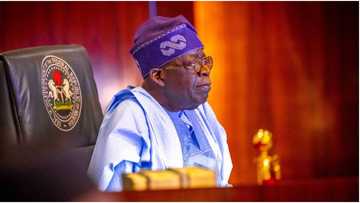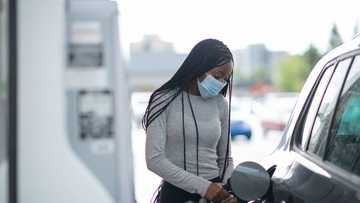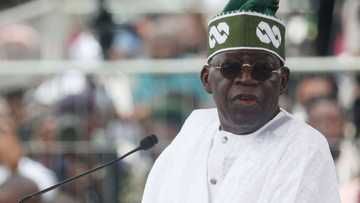N1,000/litre: Fuel Crisis Hits Nigerian Border Communities as Petrol Prices Skyrocket
- Border communities in Ogun state buy fuel between N800 and N1,000
- The past administration had ordered limited fuel to those who lived less than 20 kilometers from the country's borders
- Due to the high cost of fuel in the border regions, a major portion of the population is heavily dependent on the black market.
The price of a litre of Premium Motor Spirit (PMS), generally known as gasoline, has increased to N1,000 in Ogun State's border areas.
This follows the increase in the price of gasoline at the pump to N617 per litre by the Nigerian National Petroleum Corporation (NNPC)
While some parts of Abeokuta and other cities offer a litre of fuel for between N500 and N600, Daily Trust reports that inhabitants of border communities pay between N800 and N1,000 for the same commodity.

Read also
From N197 to N617: Video of Tinubu campaigning to crash fuel price resurfaces online amid hike
According to locals in Idiroko, Ijofin, Agosasa, Ipokia, and Iwoye Ketu, all of which are located in the Ipokia and Imeko Afon local government areas, a litre of gasoline costs between N800 and N1000.

PAY ATTENTION: Share your outstanding story with our editors! Please reach us through info@corp.legit.ng!
Border town mostly affected by fuel hike
The continual prohibition halting the delivery of petroleum products within a 20km radius of the country's border with the Benin Republic has a particularly negative impact on border towns.
In 2019, former president Muhammadu Buhari limited the delivery of petroleum products to Nigerians who lived less than 20 kilometers from the country's borders in order to stop fuel being diverted to neighboring nations at subsidized prices.
Although the Buhari administration later permitted certain filling stations to sell fuel in border regions, the number is negligible compared to the local populace. Many of the locals rely largely on the illicit market for fuel because it is extremely expensive in the border regions.
Residents use alternatives
In order to save money, many residents in the border town of Iwoye Ketu in the Imeko-Afon Local Government Area of the state, according to CDA Chairman Ahmed Ismaila, have given up their cars and switched to motorcycles. He also noted that the cost of local transportation has increased by about 300% in the region.
He said,
“First, the government must restore fuel supply to border towns. We are Nigerians, but we are being deprived of our rights because we live in border towns.
“Even when petrol was selling for about N190, we bought at N300 here. I urge the government to lift the ban which has been in place since 2019.”
The least expensive gasoline in the Ijofin area, according to resident Abdulganiyu Alabi, is N900 a litre. However, he lamented that most of the filling stations in the border areas that were given waivers often sell to their friends.

Read also
"N860/Dollar": Petrol marketers recent government policy, naira devaluation for hike in prices
Alabi claimed that travelers from Ijofin to Idiroko, which is less than seven kilometers away, pay motorcyclists N3,500. He urged the government to repair the awful Ijofin-Agosasa road, claiming that it is extremely valuable economically to the border settlements.
NNPC Speaks on Fuel Price Increase to N617 per Litre, Lagosians Pay Less
The Nigerian National Petroleum Company Limited's (NNPCL) Group Chief Executive Officer, Mele Kyari, has presented an explanation of the increased fuel rates. Kyari assured Nigerians that the strategy is for the benefit of the nation while attributing the increase in petrol prices from N540 to N617 per litre to market forces, Legit.ng earlier reported.
A market-regulated pricing model is being used in the country as a result of the withdrawal of the fuel subsidy, he added, so the price of gasoline won't remain static.
Source: Legit.ng



